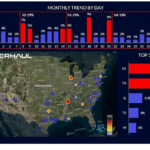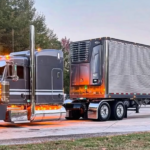The Colorado State Patrol (CSP) is informing commercial vehicle drivers that Ports of Entry in the state will transition to cashless payments starting next year.
Beginning January 1, 2025, all Colorado Ports of Entry will no longer accept cash payments. Instead, professional drivers will need to use credit cards or checks for any transactions.
A CSP representative provided a statement to CDLLife explaining the reasons for the move to a cashless system next year.
“The decision to go cashless is a security decision for the Port of Entry. We do not foresee any issues with this change, as the majority of transactions are currently done with credit cards. We are also in the process of developing online purchasing options so permits can be obtained before entering Colorado.“
In June 2022, Colorado enacted a law mandating that retail businesses must accept U.S. currency, including federal reserve notes, at at least one point of sale at each location. However, this requirement does not extend to Ports of Entry.
Numerous social media users have raised concerns about CSP’s decision to stop accepting cash next year, arguing that cash is “legal tender for all debts, public and private.” Some also voiced worries about potential fees associated with using credit cards.
A trucker’s wife noted, “The hubby (an OTR driver) said that most of these stations frequently get robbed so that’s probably why they’re going cashless, and the company he drives for will cover it so he’s not paying out of pocket for it.”
“Why not? Ain’t it kinda awkward that the government won’t take its own currency that it made?” asked one commenter.
“Is the CSP covering the 2-4% credit card fee? Or will there not be a change?” asked a Facebook user.
“So when the government won’t even take its own currency as payment, something is very very wrong. It’s printed on the money “this note is legal tender for all debts public and private.” They have to accept cash,” another person said.
“Agreed about the legal currency, and what about the additional 3+% fee for cc’s? Does the driver have to pay for that too?” one person pointed out.
“Can’t wait to see how this holds up in court,” wrote one Facebook user.





